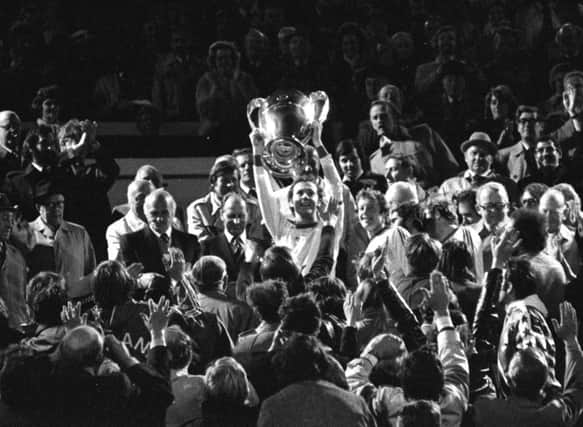Aidan Smith: The tackle that changed football history


You need a translation? Your German not quite as good as mine? “Welcome, Bayern Munich, or as we’ll call you, Munich Bayern. You are visiting the home of the famous Hibernian FC, pioneers of European football, floodlights, sloping pitches, and a brilliant forward-line named after Enid Blyton’s ginger beer-swilling quintet of short-trousered adventurers. The Famous Five aren’t playing tonight – they’ve moved on or given up – and that’s lucky for you. You’ll remember a friendly at your place in 1950 when we thrashed you 6-1. But Joe Baker is in the team and he’s pretty useful. You are not yet a superclub, FC Hollywood, a Pep Guardiola stop-off on his grand tour, a Carlo Ancelotti late-career option, but you soon will be. And as you go on to greatness the Hibees will still be trailblazing. On the top of the enclosure we call der Cowshed we will instal an electronic scoreboard, Scotland’s first. It will flash up GO...L! Sometimes GOA...! Did Hibs play in Goa in the 1950s? They did just about everywhere else ... ”
But who would have thought, 56 years after that game, that Hibs would be entertaining Bayern again, only this time in a women’s match? There’s pioneering for you. And not a friendly this time but a tie in the distaff version of the Champions League. There’s trailblazing too.
Advertisement
Hide AdAdvertisement
Hide AdWhat a transformation there has been in German football since 1960, and what a transformation too in the fortunes of Bayern. The Bundesliga wouldn’t come into existence for another three years. Hibs’ 3-0 win – with goals from Baker, Tommy Preston and Johnny MacLeod – would be their fourth in a row over Bayern. The programme listed the visitors’ modest achievements beginning with the Bavarian title in 1926, although if you read Uli Hesse’s excellent new history Bayern: Creating a Global Superclub (Yellow Jersey) you’ll find out that it was a Scottish coach who steered them to that very first prize. James McPherson is a shadowy figure, “about whom little seems to be known”, according to Hesse, “except that he was fanatical about conditioning”. Could we call him, if not quite the father, then the distant Scottish uncle of fabled Germanic efficiency? I don’t see why not.
Regularly duffed up by the Hibees they might have been, but the programme noted that Bayern in 1960 were running seven schoolboy teams, eight junior sides, five amateur sides plus the reserves. No British clubs were doing that then. The groundwork was being laid.
Around this time the teenage Sepp Maier, a right-winger, was playing under-15s for TSV Haar when the regular keeper broke a hand before a cup game against Bayern. “You’re playing in goal,” said the coach. Maier grumped and legend can’t decide whether he conceded nine or as many as 12. Raging by then, he stormed off to be informed by Bayern’s youth supremo: “You were really good. What’s your name?”
Around this time, too, Franz Beckenbauer, a striker, was playing under-14s for SC Munich against 1860 Munich in a championship decider. Quite apart from his team losing 4-1, when Beckenbauer complained about a late tackle he got punched in the face. The future Kaiser had had his heart set on a career with 1860 but, nursing his sore jaw, declared: “I’m not going to join that club. I will play for Bayern.”
Beckenbauer’s assailant is even more mythological than old Jimmy McPherson. Hesse reports that at least three men have claimed the honour, the most recent being a former restaurant owner called Gerhard Konig who, in a reversal of the Maier incident, says he was a goalkeeper required to play outfield, hence the poorly timed challenge. Whoever the man is, the tackle was seismic: it changed football history.
Fast-forward a quarter of a century and Beckenbauer is at Easter Road for Raith Rovers’ “home” leg of the UEFA Cup-tie against Bayern. He turns to late Hibees chairman Dougie Cromb and says: “This is a wonderful stadium.” Surely this was the Kaiser being polite. Easter Road still had its old wooden-seat stand and the rumbustious enclosure across the park. Bayern by then had achieved exactly half of the 26 titles they currently hold. They surely couldn’t be envying very much in the rest of football.
This was maybe an example of the “homely, familial, warm Bayern” which Hesse says does exist. “There is a deep-rooted cliche in Germany that says Bayern fans are merely glory-hunters, customers rather than supporters,” he writes. Uli Hoeness strongly denies this. It’s other clubs which are driven by investors and lack an overarching philosophy. Bayern exist as a “surrogate family”.
This is difficult for us to accept. We see a monster just waiting for the next brilliant young player reared by Borussia Dortmund so they can nick him, making retention of the Bundesliga that much more straightforward. And as early in the league’s existence as 1968 Bayern was irritating the rest of German football to the extent Maier was being attacked by an opposition fan brandishing an umbrella who roared: “I’m going to kill you, you Bayern pig!”
Advertisement
Hide AdAdvertisement
Hide AdThe very same season Hibs started having difficulties with German teams, SV Hamburg putting them out of the Inter Cities Fairs Cup, though as Pat Stanton once told me, there were mitigating circumstances: “We were surprised not to have been forewarned about Hamburg’s winger, a tricky bald guy. But that was because our dossier on Hamburg had a photo of him with a full head of hair. He always took off his wig before games!”